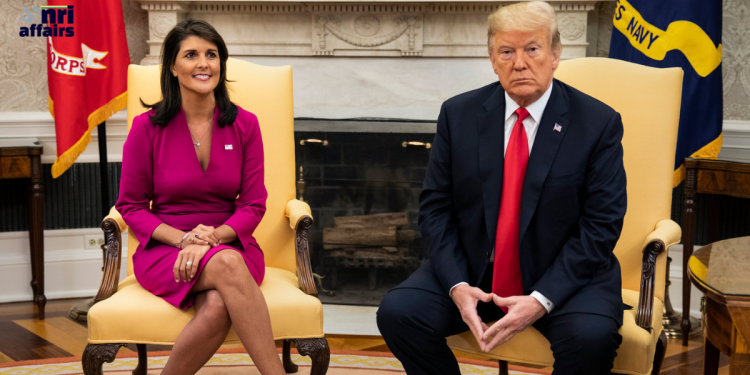In the ever-complex landscape of U.S. politics, high-profile exclusions from a former president’s inner circle are seldom without reason. Recently, the conspicuous absence of Indian-American politician Nikki Haley from Donald Trump’s cabinet and advisory selections has drawn widespread attention. As a former U.S. Ambassador to the United Nations under Trump and a notable figure within the Republican Party, Haley’s omission signals potential ideological rifts, personal differences, and strategic calculations within the Republican Party. By examining Trump’s motives, party dynamics, and the broader implications, we gain insight into how Haley’s exclusion could reshape the Republican landscape.
Nikki Haley: Background and Rise in U.S. Politics
Born to Indian immigrants, Nikki Haley, formerly known as Nimrata Nikki Randhawa, represents a unique blend of conservative values and cultural diversity. Haley’s political career began with her role in the South Carolina House of Representatives, where her pragmatic policies and leadership skills earned her widespread respect.
Rising swiftly within the Republican Party, she later became the Governor of South Carolina, further solidifying her influence. Her tenure as governor was marked by strong conservative policies combined with efforts to bridge divides across cultural and political lines. This blend of diplomacy and conservatism eventually earned her the position of U.S. Ambassador to the United Nations under Trump’s administration.
However, Haley’s political trajectory has been characterized by a complex relationship with Trump. Initially aligning with the former president’s vision, she was later known for occasionally diverging from his more contentious policies. This willingness to voice independent opinions has both distinguished her and, arguably, limited her trajectory within Trump’s inner political circle.
Understanding Trump’s Cabinet Strategy and Decision-Making Approach
- A Loyalty-Centric Approach Trump’s cabinet selection process is shaped heavily by loyalty and ideological alignment. Known for valuing loyalty, Trump surrounds himself with individuals who not only align with his political views but also demonstrate unwavering support. Haley’s occasional critiques of Trump, particularly on issues like foreign relations and election rhetoric, have marked her as an outlier among Trump loyalists. This occasional independence could explain her exclusion, as Trump likely sees Haley as lacking the loyalist stance he requires in his close advisors.
- Ideological Differences in Foreign Policy One of the most significant points of divergence between Haley and Trump is their approach to foreign policy. Trump’s “America First” philosophy champions a more isolationist stance, focusing on national interests and a reduction in overseas engagements. Haley, on the other hand, has consistently advocated for a strong U.S. presence in global affairs. During her tenure at the U.N., she frequently voiced support for American involvement in global security, alliances, and human rights initiatives. This ideological disparity may have contributed to Trump’s decision to distance himself from her, favoring advisors who fully align with his inward-looking foreign policy vision.
- The Politics of Perception and Base Consolidation In an era where perception shapes political capital, Trump’s decision may also stem from an effort to consolidate his base. Haley, known for her moderate views on certain issues, such as immigration reform and U.S. global involvement, appeals to more centrist Republican supporters. In contrast, Trump’s core voter base tends to lean heavily toward a more conservative agenda. By excluding Haley, Trump could be signaling to his base that he remains committed to an uncompromising conservative vision, free from moderate influences.
The Strategic Calculations: Why Haley’s Exclusion Serves Trump’s Goals
- Strengthening Influence Over the GOP Trump’s influence over the Republican Party is significant, with many candidates and political figures aligning themselves with his brand of conservatism to gain popularity. Haley, with her distinct approach and moderate stance, represents a faction within the GOP that seeks a balance between traditional conservatism and inclusivity. By sidelining Haley, Trump not only reinforces his influence but also marginalizes voices within the GOP that might favor a shift in direction, thereby ensuring the party’s identity remains closely aligned with his ideals.
- Setting the Stage for 2024 Elections With the 2024 U.S. presidential election on the horizon, Trump’s exclusion of Haley could be a strategic maneuver to preempt potential rivals. Haley’s broad appeal and track record make her a strong candidate within the GOP; by diminishing her presence and influence early on, Trump could be limiting her prospects as a possible contender. This decision may thus be less about policy and more about preemptively eliminating political competition, consolidating Trump’s position as the primary GOP candidate.
- Shaping the Republican Agenda Trump’s approach has profoundly influenced the Republican agenda, steering it toward populism, nationalism, and a reduced emphasis on diplomacy. Haley, with her globalist views and advocacy for multilateralism, represents a more traditional conservative outlook. Trump’s exclusion of Haley serves to cement his version of Republicanism, pushing the party further away from diplomatic engagement and fostering a more isolationist, nationalist image that resonates with his base.
Implications of Haley’s Exclusion on U.S. Politics and the Republican Party
- Rising Divisions Within the GOP Haley’s exclusion highlights the internal divides within the GOP, specifically the growing rift between Trump-aligned Republicans and more moderate factions. While Trump’s vision appeals to a large segment of the party, moderate Republicans, including Haley, represent a significant and influential faction. This divide could lead to increasing factionalism, potentially affecting party unity and strategy as the 2024 elections approach.
- Haley’s Potential Path Forward: A Champion for Moderate Republicans? Despite her exclusion, Haley’s political career is far from over. Her reputation, conservative yet inclusive policy approach, and Indian-American heritage make her a prominent figure in U.S. politics. The exclusion may position her as a representative voice for moderate Republicans who seek an alternative to Trump’s brand of conservatism. In the coming years, Haley could potentially emerge as a candidate championing a more centrist vision, appealing to Republicans who feel alienated by Trump’s hardline stance.
- The Impact on U.S.-India Relations and the Indian-American Community Haley’s exclusion also has symbolic implications for the Indian-American community and U.S.-India relations. As one of the most prominent Indian-American politicians, Haley has often been seen as a bridge between the U.S. and India, advocating for strong bilateral ties. Her sidelining may raise concerns within the Indian-American community regarding representation at the highest levels of government. Additionally, for India, Haley’s exclusion could mean the loss of an influential advocate within Trump’s circle, potentially affecting diplomatic engagements.
The exclusion of Nikki Haley from Donald Trump’s cabinet is emblematic of the complex power dynamics and ideological divisions within the GOP. Trump’s decision appears to be driven by a combination of loyalty expectations, ideological differences, and strategic maneuvering for the upcoming elections. This move, while reinforcing Trump’s hold over the party, also highlights the rising internal conflicts within the GOP, suggesting that the party faces an identity crisis as it balances traditional conservatism with Trump’s populist-nationalist vision.
For Nikki Haley, this exclusion could be an opportunity to chart an independent course, potentially positioning herself as a voice for moderate Republicans. As U.S. politics continues to evolve, Haley’s journey will be closely watched, as her decisions could play a pivotal role in shaping the future trajectory of the Republican Party.











